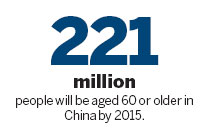 Large Medium Small
Large Medium SmallA CPPCC member suggested further tapping the religious resources of temples and monasteries to help cope with the mushrooming number of senior citizens.
Some regions should consider setting up nursing homes at temples to better take advantage of religious resources while providing a peaceful and quiet place for the aged to live, said Chen Congcong, who also is a member of the China Overseas Exchange Association.
Given that the demand for senior citizen care in nursing homes far exceeds supply in many cities and regions, the nursing homes at the temples and monasteries should play a key role in serving seniors in the future, she said.
"Compared with other nursing homes in the distant suburbs, or crowded ones in downtown cities, senior citizens living in temples could free themselves from worldly cares by chanting with the monks and watering flowers," she said.
Chen said the temples' nursing homes have been well received in many parts of Fujian province.
Doctors pay regular visits to the temple to care for the seniors, and nutritionists are hired to ensure they eat well.
Families of temple residents could take the seniors out for an occasional trip or family get-together.
The temple nursing homes get funding from collections raised by the temples' masters and abbots and from donations from social entrepreneurs, which combined is more than enough to cover daily expenses, Chen said.

"The civil affairs office and the religious department should further study such cases and explore more possibilities to cope with the graying of society," she said.
The number of people aged 60 and older will soar to 221 million by 2015.
However, the demand for senior care at nursing institutions far exceeds the availability of services.
Li Hongbing, the capital's deputy director of civil affairs, said that senior care is a challenge in Beijing despite the municipality's 5 billion yuan ($814 million) annual budget for it because the number of seniors who need care increases by 150,000 every year.
Community care
Li said that to cope with the explosive increase of senior citizens, it's necessary to rely on community-based care, in which the elderly live in their own apartments with visits by staff from nearby centers.
"Many seniors still prefer living in their own apartments," Chen said. "The community nursing homes also ease the burden on State-run nursing institutions."
To better promote door-to-door nursing services, Chen suggests the government provide elevators in residential areas that have many seniors.
According to the China National Committee on Aging, China is woefully short of nursing workers to take care of senior citizens, and many workers lack the professional knowledge they need to take care of the elderly.
"It's necessary for the government to come up with a preferential policy in the enrollment of those majoring in geriatric care, with the suspension or reduction of tuition," said CPPCC member Yang Wen, the head of Shandong Yingcai University.
zhengxin@chinadaily.com.cn